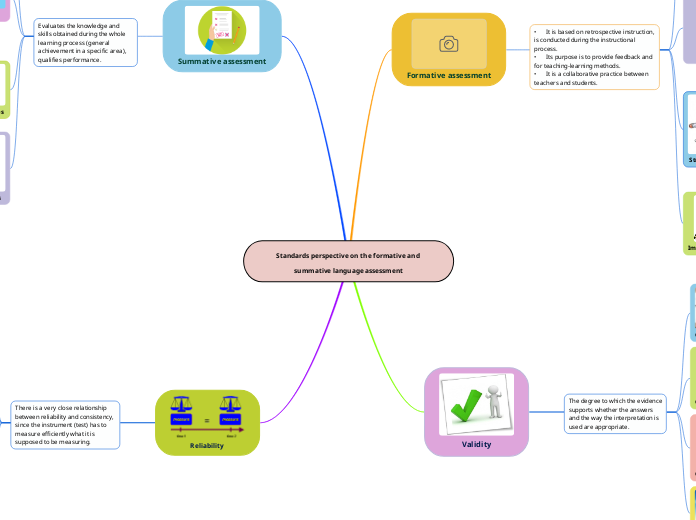av LIZETH ATALIA LAGUNAS PEREZ för 3 årar sedan
447
Standards perspective on the formative and summative language assessment

av LIZETH ATALIA LAGUNAS PEREZ för 3 årar sedan
447

Mer av detta
The test should be in accordance with the target population, paying special attention to its design and writing the items in a clear and concise manner.
Refers to the conditions under which the test will be taken (environment and familiarity with the process).
Human error or subjectivity can affect the scoring process.
Intra-rater reliability
the same evaluator scores the same data at different times.
Inter-rater reliability
two or more evaluators score the same data and obtain different results.
An evaluation can be inconsistent when the student manifests factors (fatigue, anxiety, illness, etc.) that alter the truth value of a specific score.
There is a small probability of error
Replicable
Persistence with learning.
Motivates students to continue their efforts.
Students benefit from the external uses of this assessment (professional qualifications, job selection, school performance).
Process-focused assessments
Prioritize student ingenuity
Performance-assessments
Improve student understanding in a practical way
Product-assessments
Deliver the final product previously agreed upon according to the guidelines.
Authenticity
Must take into account the real world in terms of applicability and concordance.
Validity
Must conform to guidelines that justify meaning and utility
Reliability
Consistent at the time of application and reliable
Practicality
It is affordable in terms of cost and time; in addition, the evaluation process is efficient.
Establish eligibility for study programs.
Determine the success of students at a given point in time.
It refers to the effect and impact of the evaluation on the students' reality.
It comprises a set of knowledge and skills about a specific area that requires additional data to make inferences to be measured.
Provided that the results match equally with those of the criterion measure of other tests of the same nature.
Content validity has to do with the reasonableness of the skill or knowledge provided in the course.
Requirements
The performance of the examinees must conform to the content to be assessed.
Sample the subject matter from which conclusions are drawn.
It is effective at the time of evaluation
Good class management is achieved
It is a useful resource throughout the duration of the course
Acceptance by students
They strive to achieve the socialized objectives
Engage with their learning
allow students to be involved in the process of making decisions about their classes and learning.
Structuring lesson introductions
Start the class with a logical order (greeting, topic, objectives) and a brief description that captures the students' attention.
Sharing learning objectives
Teacher and student commit to achieve the objectives set (in terms of performance and responsibility).
Target-setting
Students become responsible for their own learning process and meaningful knowledge is achieved.
Give way for responses on feedback.
Don't disturb students' concentration.
Encourage motivation
Good feedback for self-evaluation
Combining effort and time in activities
Performance standards
Informal
Interpretation of instruction or teaching methods according to the will of the teacher.
Evidence of learning without a sensible order and documented casually.
Learning expectations that are executed without a plan in advance.
Formal
Interpretation of instruction or teaching methods based on evidence gathered.
Evidence of learning based on activities performed and documented.
Learning expectations based on a timeline.